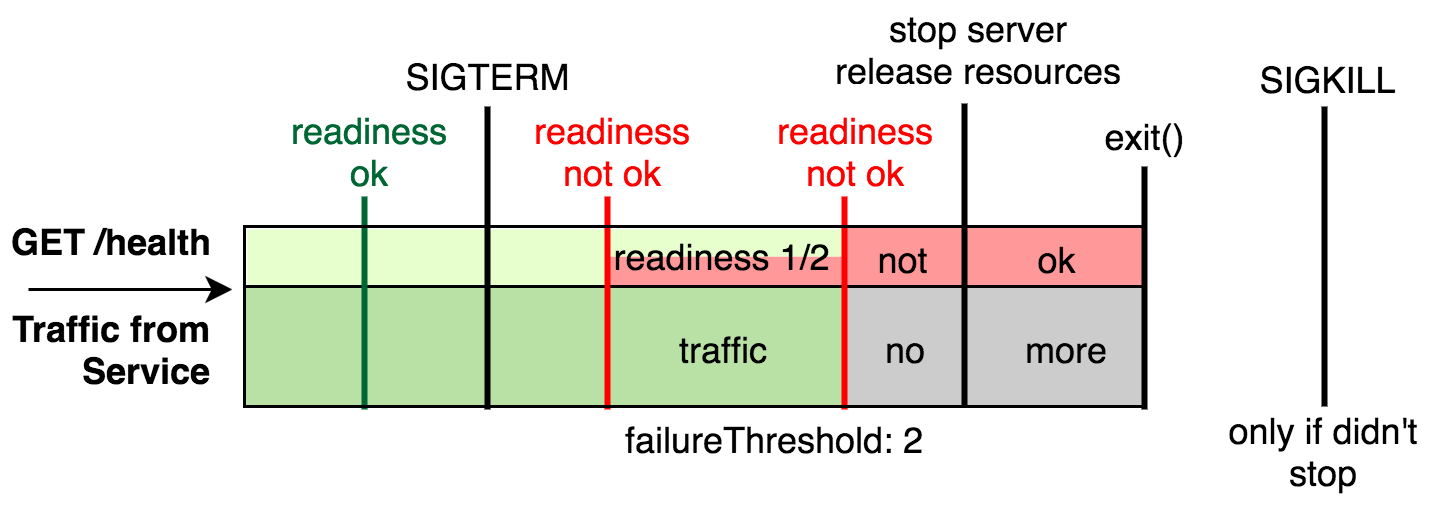Docker: Best Practices
Docker is a tool designed to make it easier to create, deploy, and run applications by using containers. Containers allow a developer to package up an application with all of the parts it needs, such as libraries and other dependencies, and ship it all out as one package.
About me
- Andrii Chyzh
- Team Leader / Senior Software Engineer @ Wix.com
Reference
Image size
Use base images with minimal size
REPOSITORY TAG IMAGE ID CREATED SIZE
debian latest 4879790bd60d 2 days ago 101MB
ubuntu latest ea4c82dcd15a 4 weeks ago 85.8MB
centos latest 75835a67d134 5 weeks ago 200MB
alpine latest 196d12cf6ab1 2 months ago 4.41MB
Don’t install unnecessary packages and remove not required
RUN apt-get -y install curl && \
curl https://test.com/file.json && \
apt-get remove -y --purge curl
Sort multi-line arguments
RUN apt-get -y install \
gnupg2 \
lsb-release \
software-properties-common \
wget
Use .dockerignore in every project, where you are building Docker images
.git
.gitignore
LICENSE
VERSION
README.md
Changelog.md
Makefile
docker-compose.yml
docs
Create own base images for yours company use cases
FROM company-name/bootstrap-onbuild:latest
Minimize the number of layers (instructions RUN, COPY, ADD creates layers) and use multi-stage builds
Case: OpenResty (Nginx + Lua)
OpenResty® is a full-fledged web platform that integrates the standard Nginx core, LuaJIT, many carefully written Lua libraries, lots of high quality 3rd-party Nginx modules, and most of their external dependencies. It is designed to help developers easily build scalable web applications, web services, and dynamic web gateways.
Regular usage
FROM debian:stretch-slim
RUN apt-get -y update
RUN apt-get -y install gnupg2 lsb-release software-properties-common wget
RUN wget -qO - https://openresty.org/package/pubkey.gpg | apt-key add -
RUN add-apt-repository -y "deb http://openresty.org/package/debian $(lsb_release -sc) openresty"
RUN apt-get update
RUN apt-get -y install openresty
RUN apt-get remove -y --purge gnupg2 lsb-release software-properties-common wget
RUN apt-get -y autoremove
RUN rm -rf /var/lib/apt/lists/*
ENV PATH="${PATH}:/usr/local/openresty/luajit/bin:/usr/local/openresty/nginx/sbin:/usr/local/openresty/bin"
COPY nginx.conf /usr/local/openresty/nginx/conf/nginx.conf
EXPOSE 80
CMD ["/usr/bin/openresty", "-g", "daemon off;"]
Base optimization
FROM debian:stretch-slim
RUN apt-get -y update && \
apt-get -y install gnupg2 lsb-release software-properties-common wget && \
wget -qO - https://openresty.org/package/pubkey.gpg | apt-key add - && \
add-apt-repository -y "deb http://openresty.org/package/debian $(lsb_release -sc) openresty" && \
apt-get update && \
apt-get -y install openresty && \
apt-get remove -y --purge gnupg2 lsb-release software-properties-common wget && \
apt-get -y autoremove && \
rm -rf /var/lib/apt/lists/*
ENV PATH="${PATH}:/usr/local/openresty/luajit/bin:/usr/local/openresty/nginx/sbin:/usr/local/openresty/bin"
COPY nginx.conf /usr/local/openresty/nginx/conf/nginx.conf
EXPOSE 80
CMD ["/usr/bin/openresty", "-g", "daemon off;"]
Multi-stage builds (from Docker 17.05)
# install stage
FROM debian:stretch-slim AS installer
RUN apt-get -y update && \
apt-get -y install gnupg2 lsb-release software-properties-common wget && \
wget -qO - https://openresty.org/package/pubkey.gpg | apt-key add - && \
add-apt-repository -y "deb http://openresty.org/package/debian $(lsb_release -sc) openresty" && \
apt-get update && \
apt-get -y install openresty && \
apt-get remove -y --purge gnupg2 lsb-release software-properties-common wget && \
apt-get -y autoremove && \
rm -rf /var/lib/apt/lists/*
ENV PATH="${PATH}:/usr/local/openresty/luajit/bin:/usr/local/openresty/nginx/sbin:/usr/local/openresty/bin"
# production stage
FROM debian:stretch-slim
COPY --from=installer /usr/local/openresty/ /usr/local/openresty/
COPY --from=installer /usr/bin/openresty /usr/bin/openresty
COPY nginx.conf /usr/local/openresty/nginx/conf/nginx.conf
EXPOSE 80
CMD ["/usr/bin/openresty", "-g", "daemon off;"]
Result
REPOSITORY TAG IMAGE ID CREATED SIZE
openresty regular 146ddc05beb7 2 minutes ago 293MB
openresty optimization 31a17c1644e3 About a minute ago 132MB
openresty multistage 1eaace3ca6d8 13 seconds ago 65.2MB
Case: Go Application
Go is an open source programming language that makes it easy to build simple, reliable, and efficient software.
Regular usage
FROM golang:alpine
WORKDIR /app
ADD . /app
RUN cd /app && go build -o goapp
ENTRYPOINT ./goapp
Multistage builds (from Docker 17.05)
# build stage
FROM golang:alpine AS builder
ADD . /src
RUN cd /src && go build -o goapp
# production stage
FROM alpine
WORKDIR /app
COPY --from=builder /src/goapp /app/
ENTRYPOINT ./goapp
Result
REPOSITORY TAG IMAGE ID CREATED SIZE
goapp regular 1e97ed6a6d3a 20 seconds ago 316MB
goapp multistage bb6ce614ba3d 13 seconds ago 11MB
Start / stop
Use start app with init all required resources
- pp starts (npm start)
- App opens DB connections
- App listens on port
- App tells the load balancer that it’s ready for requests
Use SIGTERM signal for graceful shutdown stop of app
The docker stop command attempts to stop a running container first by sending a
SIGTERMsignal to the root process (PID 1) in the container. If the process hasn't exited within the timeout period aSIGKILLsignal will be sent.
- App gets notification to stop (received
SIGTERM) - App lets know the load balancer that it’s not ready for newer requests
- App served all the ongoing requests
- App releases all of the resources correctly: DB, queue, etc.
- App exits with "success" status code (process.exit())
Runtime
Use health endpoints
- Pod receives SIGTERM signal because Kubernetes wants to stop it - because of deploy, scale, etc.
- App (pod) starts to return 500 for GET /health to let readinessProbe (Service) know that it's not ready to receive more requests.
- Kubernetes readinessProbe checks GET /health and after (failureThreshold * periodSecond) it stops redirecting traffic to the app (because it continuously returns 500)
- App waits (failureThreshold * periodSecond) before it starts to shut down - to make sure that the Service is getting notified via readinessProbe fail
- App starts graceful shutdown
- App first closes server with live working DB connections
- App closes databases after the server is closed
- App exits process
- Kubernetes force kills the application after 30s (SIGKILL) if it's still running (in an optimal case it doesn't happen)
Use internal HEALTHCHECK instruction
HEALTHCHECK --interval=5m --timeout=3s CMD curl -f http://localhost/ || exit 1
In app use retries of connections or requests to external
- Re-connect for databases and storages (MongoDB, Redis, Kafka etc)
- Use retries with
exponential backoffstrategy for all HTTP requests to external
Configuration
- Store config in the environment
- Use env variables
- Can use database for storing and updating settings without reload of app
Logging
- Use
STDOUTandSTDERRfor logging - Use common format for logs (some structure, JSON etc)
Docker Compose
- Use startup-order

